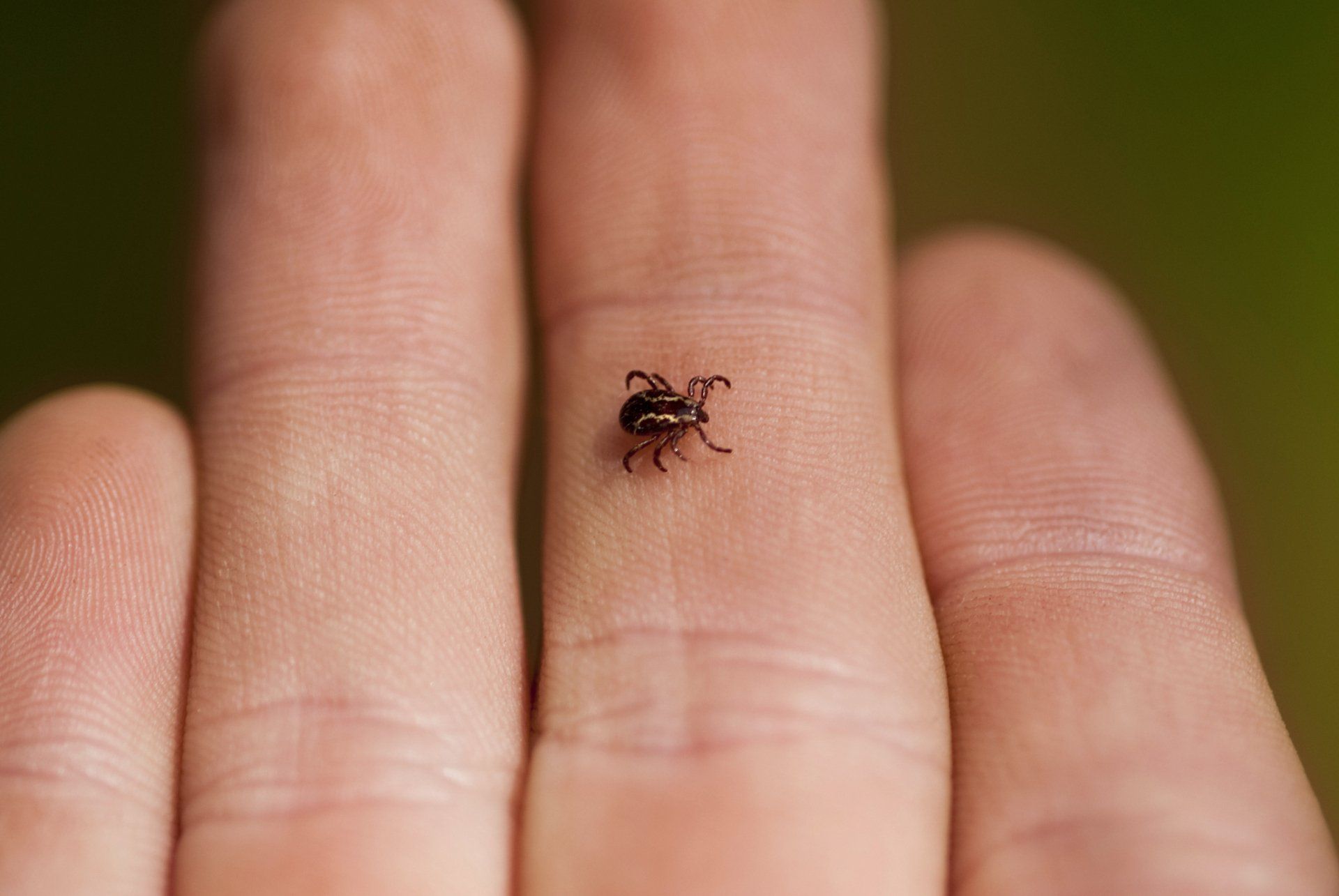Tick Removal and Remediation
Ticks are small, parasitic insects that feed on the blood of mammals, birds, and sometimes reptiles and amphibians. Ticks are vectors for several serious diseases, including Rocky Mountain spotted fever, typhus, and Lyme disease. Ticks go through four life stages: egg, larva, nymph, and adult. The first three stages are spent off of a host, while the adult stage requires a blood meal from a host in order to reproduce.
Ticks attach themselves to their hosts using specialized mouthparts and feed for several days before falling off. Ticks can transmit disease during any of their life stages; however, the risk is greatest during the adult stage when they are most likely to be attached to a host for an extended period of time.

Ticks are found in wooded or grassy areas where their hosts commonly travel. Ticks can also be brought into homes on clothing or pets. To prevent tick bites, people should avoid walking in wooded or grassy areas and should wear long-sleeved shirts and pants when possible. In addition, people should regularly check their clothes and body for ticks after spending time outdoors. If a tick is found attached to the skin, it should be removed promptly and carefully to avoid infecting the person with a disease. Ticks pose a serious health risk to people and animals alike, and it is important to take steps to avoid them.
Size:
1/16" to ½"
Color: Black
How to Recognize:
Are usually discovered once they have attached themselves to a host, by their engorged bodies.
Habitat:
Must have a host, often dogs/wildlife, but will attach themselves to humans as well.
Behavior:
Survive on blood meals from a host. Transmit serious diseases such as Rocky Mountain spotted fever, Typhus, and Lyme Disease.
Ticks are small, parasitic insects that feed on the blood of mammals, birds, and sometimes reptiles and amphibians. Ticks are vectors for several serious diseases, including Rocky Mountain spotted fever, typhus, and Lyme disease. Ticks go through four life stages: egg, larva, nymph, and adult. The first three stages are spent off of a host, while the adult stage requires a blood meal from a host in order to reproduce.
Ticks attach themselves to their hosts using specialized mouthparts and feed for several days before falling off. Ticks can transmit disease during any of their life stages; however, the risk is greatest during the adult stage when they are most likely to be attached to a host for an extended period of time.
Ticks are found in wooded or grassy areas where their hosts commonly travel. Ticks can also be brought into homes on clothing or pets. To prevent tick bites, people should avoid walking in wooded or grassy areas and should wear long-sleeved shirts and pants when possible. In addition, people should regularly check their clothes and body for ticks after spending time outdoors. If a tick is found attached to the skin, it should be removed promptly and carefully to avoid infecting the person with a disease. Ticks pose a serious health risk to people and animals alike, and it is important to take steps to avoid them.
Size:
1/16" to ½"
Color: Black
How to Recognize: Are usually discovered once they have attached themselves to a host, by their engorged bodies.
Habitat: Must have a host, often dogs/wildlife, but will attach themselves to humans as well.
Behavior: Survive on blood meals from a host. Transmit serious diseases such as Rocky Mountain spotted fever, Typhus, and Lyme Disease.

Ticks are small, parasitic insects that feed on the blood of mammals, birds, and sometimes reptiles and amphibians. Ticks are vectors for several serious diseases, including Rocky Mountain spotted fever, typhus, and Lyme disease. Ticks go through four life stages: egg, larva, nymph, and adult. The first three stages are spent off of a host, while the adult stage requires a blood meal from a host in order to reproduce.
Ticks attach themselves to their hosts using specialized mouthparts and feed for several days before falling off. Ticks can transmit disease during any of their life stages; however, the risk is greatest during the adult stage when they are most likely to be attached to a host for an extended period of time.

Ticks are found in wooded or grassy areas where their hosts commonly travel. Ticks can also be brought into homes on clothing or pets. To prevent tick bites, people should avoid walking in wooded or grassy areas and should wear long-sleeved shirts and pants when possible. In addition, people should regularly check their clothes and body for ticks after spending time outdoors. If a tick is found attached to the skin, it should be removed promptly and carefully to avoid infecting the person with a disease. Ticks pose a serious health risk to people and animals alike, and it is important to take steps to avoid them.
Size:
1/16" to ½"
Color: Black
How to Recognize:
Are usually discovered once they have attached themselves to a host, by their engorged bodies.
Habitat:
Must have a host, often dogs/wildlife, but will attach themselves to humans as well.
Behavior:
Survive on blood meals from a host. Transmit serious diseases such as Rocky Mountain spotted fever, Typhus, and Lyme Disease.
Contact Us Today
CONTACT INFORMATION
Phone: (573) 885-2420
Email: a_apestcontrol@yahoo.com
Address: 304 Theresa St, Cuba, MO 65453
Cuba Chamber of Commerce
National Pest Management association
BUSINESS HOURS
- Mon - Fri
- -
- Sat - Sun
- Closed
PAYMENT METHODS





CONTACT INFORMATION
Phone: (573) 885-2420
Email: a_apestcontrol@yahoo.com
Address: 411 N Franklin St
Cuba Chamber of Commerce
National Pest Management association
BUSINESS HOURS
- Mon - Fri
- -
- Sat - Sun
- Closed
PAYMENT METHODS





